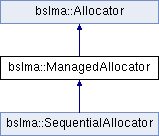Loading...
Searching...
No Matches
bslma::ManagedAllocator Class Referenceabstract
#include <bslma_managedallocator.h>
Inheritance diagram for bslma::ManagedAllocator:

Public Member Functions | |
| virtual void | release ()=0 |
| Release all memory currently allocated through this allocator. | |
 Public Member Functions inherited from bslma::Allocator Public Member Functions inherited from bslma::Allocator | |
| ~Allocator () BSLS_KEYWORD_OVERRIDE | |
| virtual void * | allocate (size_type size)=0 |
| virtual void | deallocate (void *address)=0 |
| template<class TYPE > | |
| void | deleteObject (const TYPE *object) |
| template<class TYPE > | |
| void | deleteObjectRaw (const TYPE *object) |
| void | deleteObject (bsl::nullptr_t) |
| void | deleteObjectRaw (bsl::nullptr_t) |
 Public Member Functions inherited from bsl::memory_resource Public Member Functions inherited from bsl::memory_resource | |
| memory_resource () BSLS_KEYWORD_DEFAULT | |
| Create this object. Has no effect other than to begin its lifetime. | |
| memory_resource (const memory_resource &) BSLS_KEYWORD_DEFAULT | |
| virtual | ~memory_resource () |
| Destroy this object. Has no effect other than to end its lifetime. | |
| memory_resource & | operator= (const memory_resource &) BSLS_KEYWORD_DEFAULT |
| Return a modifiable reference to this object. | |
| BSLS_ANNOTATION_NODISCARD void * | allocate (size_t bytes, size_t alignment=k_MAX_ALIGN) |
| void | deallocate (void *p, size_t bytes, size_t alignment=k_MAX_ALIGN) |
| bool | is_equal (const memory_resource &other) const BSLS_KEYWORD_NOEXCEPT |
Additional Inherited Members | |
 Public Types inherited from bslma::Allocator Public Types inherited from bslma::Allocator | |
| typedef std::size_t | size_type |
 Static Public Member Functions inherited from bslma::Allocator Static Public Member Functions inherited from bslma::Allocator | |
| static void | throwBadAlloc () |
 Protected Member Functions inherited from bslma::Allocator Protected Member Functions inherited from bslma::Allocator | |
| void * | do_allocate (std::size_t bytes, std::size_t alignment) BSLS_KEYWORD_OVERRIDE |
| void | do_deallocate (void *p, std::size_t bytes, std::size_t alignment) BSLS_KEYWORD_OVERRIDE |
| bool | do_is_equal (const memory_resource &other) const BSLS_KEYWORD_NOEXCEPT BSLS_KEYWORD_OVERRIDE |
Detailed Description
Provide a protocol for allocators with the ability to release all memory currently allocated through the protocol back to the memory supplier of the derived concrete allocator object.
Member Function Documentation
◆ release()
|
pure virtual |
Implemented in bslma::SequentialAllocator.
The documentation for this class was generated from the following file: